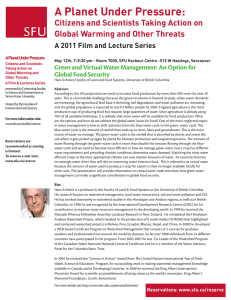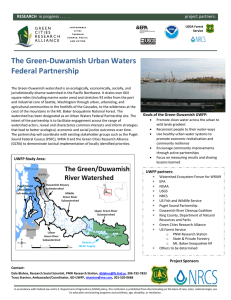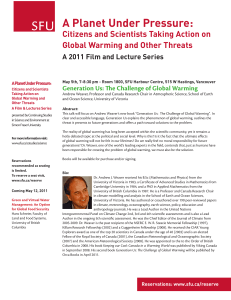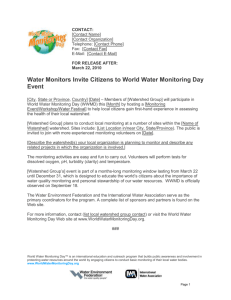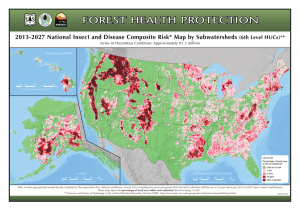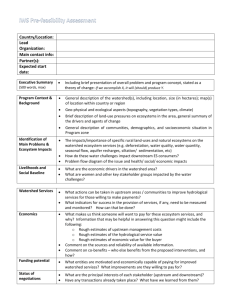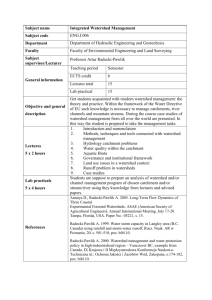A Planet Under Pressure: Global Food Security
advertisement
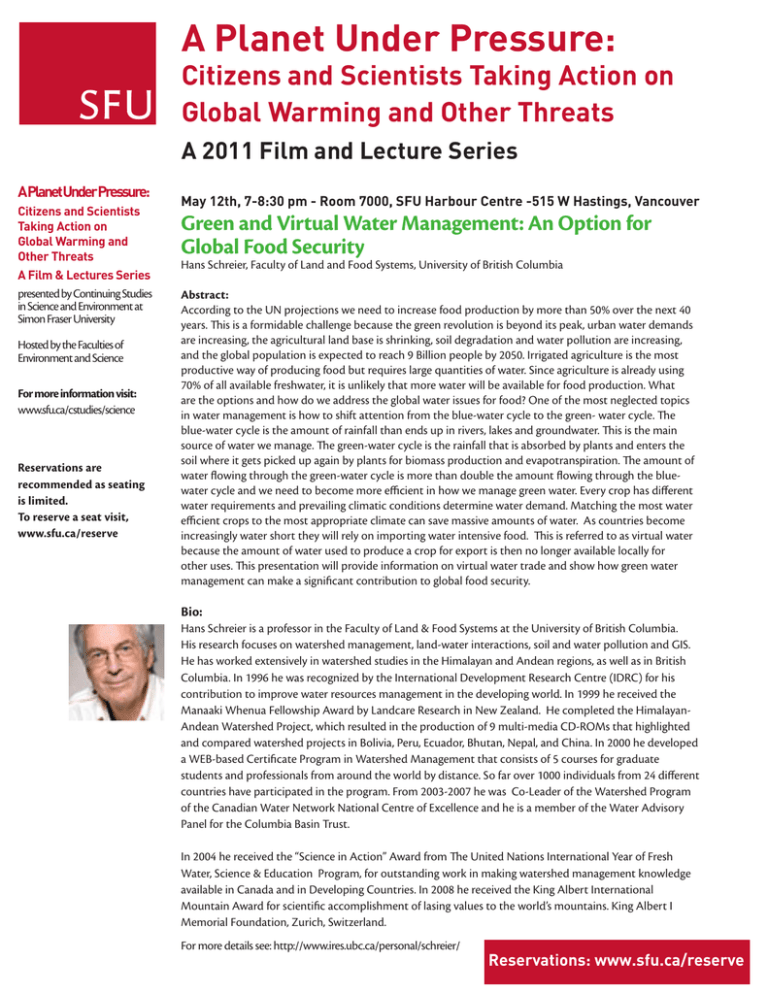
A Planet Under Pressure: Citizens and Scientists Taking Action on Global Warming and Other Threats A 2011 Film and Lecture Series APlanetUnderPressure: Citizens and Scientists Taking Action on Global Warming and Other Threats A Film & Lectures Series presented by Continuing Studies in Science and Environment at Simon Fraser University Hosted by the Faculties of Environment and Science For more information visit: www.sfu.ca/cstudies/science Reservations are recommended as seating is limited. To reserve a seat visit, www.sfu.ca/reserve May 12th, 7-8:30 pm - Room 7000, SFU Harbour Centre -515 W Hastings, Vancouver Green and Virtual Water Management: An Option for Global Food Security Hans Schreier, Faculty of Land and Food Systems, University of British Columbia Abstract: According to the UN projections we need to increase food production by more than 50% over the next 40 years. This is a formidable challenge because the green revolution is beyond its peak, urban water demands are increasing, the agricultural land base is shrinking, soil degradation and water pollution are increasing, and the global population is expected to reach 9 Billion people by 2050. Irrigated agriculture is the most productive way of producing food but requires large quantities of water. Since agriculture is already using 70% of all available freshwater, it is unlikely that more water will be available for food production. What are the options and how do we address the global water issues for food? One of the most neglected topics in water management is how to shift attention from the blue-water cycle to the green- water cycle. The blue-water cycle is the amount of rainfall than ends up in rivers, lakes and groundwater. This is the main source of water we manage. The green-water cycle is the rainfall that is absorbed by plants and enters the soil where it gets picked up again by plants for biomass production and evapotranspiration. The amount of water flowing through the green-water cycle is more than double the amount flowing through the bluewater cycle and we need to become more efficient in how we manage green water. Every crop has different water requirements and prevailing climatic conditions determine water demand. Matching the most water efficient crops to the most appropriate climate can save massive amounts of water. As countries become increasingly water short they will rely on importing water intensive food. This is referred to as virtual water because the amount of water used to produce a crop for export is then no longer available locally for other uses. This presentation will provide information on virtual water trade and show how green water management can make a significant contribution to global food security. Bio: Hans Schreier is a professor in the Faculty of Land & Food Systems at the University of British Columbia. His research focuses on watershed management, land-water interactions, soil and water pollution and GIS. He has worked extensively in watershed studies in the Himalayan and Andean regions, as well as in British Columbia. In 1996 he was recognized by the International Development Research Centre (IDRC) for his contribution to improve water resources management in the developing world. In 1999 he received the Manaaki Whenua Fellowship Award by Landcare Research in New Zealand. He completed the HimalayanAndean Watershed Project, which resulted in the production of 9 multi-media CD-ROMs that highlighted and compared watershed projects in Bolivia, Peru, Ecuador, Bhutan, Nepal, and China. In 2000 he developed a WEB-based Certificate Program in Watershed Management that consists of 5 courses for graduate students and professionals from around the world by distance. So far over 1000 individuals from 24 different countries have participated in the program. From 2003-2007 he was Co-Leader of the Watershed Program of the Canadian Water Network National Centre of Excellence and he is a member of the Water Advisory Panel for the Columbia Basin Trust. In 2004 he received the “Science in Action” Award from The United Nations International Year of Fresh Water, Science & Education Program, for outstanding work in making watershed management knowledge available in Canada and in Developing Countries. In 2008 he received the King Albert International Mountain Award for scientific accomplishment of lasing values to the world’s mountains. King Albert I Memorial Foundation, Zurich, Switzerland. GREEN NEIGHBORHOODS For more details see: http://www.ires.ubc.ca/personal/schreier/ Reservations: www.sfu.ca/reserve Crop Evapotranspira7on for Domes7c & Export Produc7on (Billion m3/Year) 1000 900 800 700 600 500 400 300 200 100 0 Export Domes7c Virtual Water & Trade Determining the Value of Virtual Water Flood and Drought in the Mississippi Basin at the Same Time (May 2011) Summary
